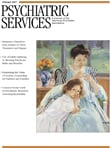Pete Earley, a former Washington Post journalist and author of several nonfiction books on crime, turns his journalistic skills to an investigation of the criminalization of mental illness in American society in his latest book, Crazy . He is impelled to write by the heartbreak he experiences when his son is diagnosed as having bipolar disorder and arrested after committing a crime. The arrest launches Earley directly into unraveling the complicated relationship between our country's criminal justice system and mental health policies. The book tells two stories. The first is a depiction of his son's journey into the craziness of our "broken mental health system," and the second is a record of the author's yearlong investigation of the Miami-Dade City Jail and the surrounding community.
Given unrestricted access to the city jail, Earley shadows inmates and patients and tells their personal stories in conjunction with interviews with family members, mental health professionals, correctional officials, police, lawyers, judges, historians, and legislators. Over the course of a year he uncovers the maze of contradictions and complexities that exist in our current mental health laws in the wake of deinstitutionalization. Although Earley's journalistic investigation does not tell a completely new story—most of the facts he reports have already been noted by E. Fuller Torrey, the well-known psychiatrist and public advocate for mental health reform—his story nevertheless is a moving and human portrait of what life is like for someone struggling with serious mental illness in this country today.
Earley's only failure is that he does not fully recognize the perspective of those who may be the victims of crimes committed by people with mental illness. In the case of his own son, Earley presents a critical attack on the family who felt violated and afraid after his son broke into their unoccupied home during a psychotic episode and caused thousands of dollars of damage. Despite this one limitation, Earley does a commendable job of depicting the irrationalities of our current mental health and legal systems and advocates effectively for much needed reform.
The audience for Earley's book will certainly include the layperson because he presents a very compelling account of what it is like for family members struggling to get help under current mental health laws for a loved one who suffers from a mental illness. He accurately describes the despair and desperation relatives encounter when a loved one is psychotic and unable to make rational and appropriate decisions about his or her mental health treatment. At the same time, for those of us who work in the mental health profession and are already familiar with these frustrations, Earley's book reminds us in a poignant and human way what it is like to be on the receiving end of our services.

